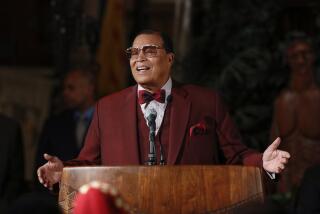Op-Ed: The rising number of boycotts diminishes respect for a valuable tactic

Marc Gafni, an ex-rabbi who lives in Northern California, has been accused of a multitude of sins, including sexual abuse of a 13-year-old (he admitted there was sexual contact, but said she was “14 going on 35”), affairs with students and plagiarism. He now makes his living as a New Age teacher of “integral wisdom” and offers seminars on “total-body orgasms.” Earlier this year, he was repudiated by hundreds of rabbis and other spiritual leaders in an online petition covered by the national media.
But one friend stood by him. In recent years, John Mackey, founder and CEO of Whole Foods, has appeared publicly with Gafni and given to Gafni’s nonprofit. “Loyalty and the presumption of innocence are important values to me,” Mackey said in June, “so I will not join those who are condemning him.”
In response, Gafni’s detractors have gone after Whole Foods. “I refuse to support any company that openly backs a pedophile,” Nikki DuBose, the model turned mental-health advocate, wrote in an article for the Huffington Post. And though there is no organized boycott yet, activists held small protests in May at Whole Foods stores in New York and Los Angeles. “Whom John Mackey supports is public,” Rabbi David Ingber told Tablet magazine. “It’s part of the brand of Whole Foods, and we as consumers have a responsibility to speak out.”
Mackey’s support for Gafni is inexcusable. But is that cause for a boycott? It’s a timely question, because boycotts are everywhere these days. In the last few years, I have been asked to boycott the University of Illinois, Chick-fil-A, Wendy’s, the states of North Carolina and Indiana, and Israel. Those boycotts were organized by liberals, but the right is trigger-happy too. Conservatives went after JCPenney because it ran an ad featuring a male couple with children, and Target because it announced that transgender individuals could use whichever bathroom they chose at its stores. EthicalConsumer.org lists dozens of ongoing boycotts: against Air France, Bacardi, Ben & Jerry’s, China and plenty more before we even get to the letter D.
Boycotts have upsides. Sometimes, a coordinated effort to persuade people not to pay for a particular service helps achieve a just result. The Montgomery bus lines were pushed near insolvency by the boycott of 1955 to 1956. Other times, economic pressure is less important than the attention a boycott brings: Most people never thought about apartheid until a worldwide boycott effort in the 1980s made South Africa a pariah.
And even when they don’t seem to get results, boycotts may forge communities. The boycott supporting the Delano grape strike in California, which lasted from 1965 to 1970, not only resulted in a significant victory for labor but helped create a sense of solidarity among Latino farm workers.
Yet boycotts are crude instruments. They have unintended victims: namely, the workers who have no responsibility for policy but are adversely affected if a company loses business.
Boycotts are also selective. The call by some activists to boycott Israel for its treatment of Palestinians (the “BDS” movement, for Boycott, Divest and Sanction) has led critics to ask why the boycotters are relatively uninterested in the nation’s neighbors, like Iran, which executes gays, and Saudi Arabia, which executes gays, imprisons cross-dressers and doesn’t allow women to drive.
Boycotts are becoming modes of identity, less about the boycotted and more about the boycotter.
Of course, all activism is selective, and it has to begin somewhere. But it’s problematic that boycotts can only punch so high up — a boycott of the United States is absurd on its face. By contrast, Cubans were immiserated for decades by our embargo — an embargo is a forced boycott — which never did drive out the Communists. In 1990, boycotts of Korean grocers operating in two African American neighborhoods in New York City took on decidedly racist overtones.
Some boycotts involve sacrifice on the part of the consumer, but many don’t. In the age of Amazon, Orbitz and ecommerce, we have so many purchasing options that eliminating one or two doesn’t entail hardship.
For that reason, boycotts are becoming modes of identity, less about the boycotted and more about the boycotter. I am the kind of person who doesn’t shop at Wal-Mart because of its anti-union policies. But I know that Wal-Mart couldn’t care less. As the Christian blogger Jake Meador writes, “In the absence of real dependence upon one another, commerce has ceased to be a matter of sustaining one’s material life and the life of one’s neighborhood and has, instead, become a method for self invention.”
It’s already the case that conservatives have their stores, liberals have theirs—Wal-Mart shoppers and Whole Foods shoppers don’t bump into each other much. Boycotts worsen this problem and alienate us ever more from our fellow citizens. What happens when a polarized country falls in love with the boycott? Whole states become off-limits because of legislatures’ bathroom politics.
I don’t have a master theory for when to boycott and when to refrain. But at the very least, we should get back to basics.
It’s creepy that Whole Foods CEO John Mackey (who did not return my calls) is a friend of Marc Gafni’s, but it’s a stretch to say that Whole Foods supports sexual abuse. Anyone who wants to boycott the company can easily find a better reason — say, its unscientific claims about what their products can do.
In general, we should focus on the actions of the companies themselves, not the people who run them. And if we prioritize indisputable social ills — like the mistreatment of workers, bad science or the destruction of the environment — we can elevate a valuable tactic now diminished by overuse
Mark Oppenheimer is filling in for Doyle McManus. He is a contributing writer to Opinion.
Follow the Opinion section on Twitter @latimesopinion or Facebook
More to Read
A cure for the common opinion
Get thought-provoking perspectives with our weekly newsletter.
You may occasionally receive promotional content from the Los Angeles Times.






